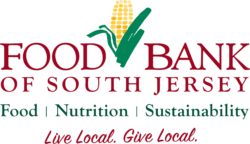By Kim Mulford for the Courier-Post | PENNSAUKEN — Valerie Brown Traoré likes to dream a lot — “big, hairy, audacious dreams,” as she calls it.
Since she began leading the Food Bank of South Jersey 11 years ago, the Baltimore native has dreamed about doing more than giving away bags of food and teaching people how to cook healthy meals.
“What if we use food as a driver for social, economic and environmental change — and not just for poor people, but for anybody who identifies themselves as being in need of it?” said Traoré, president and CEO of the Food Bank of South Jersey.
What if the food bank invested in micro businesses? What if it could train people to process fresh produce, drive a forklift or run a family operation? What if her donation-dependent organization could use food to find more ways to make money?
Over the next few years, the nonprofit will put those questions to the test with its new strategic plan. Traoré calls it a “paradigm shift,” a radical new way of operating that will give recipients a chance to earn a livable income, and enable the nonprofit to sustain itself.
Food banks across the country are shifting operations to focus on sustainable solutions to hunger, noted Carlos Rodriguez, executive director of Fulfill, formerly known as the Food Bank of Monmouth and Ocean Counties.
“There are solutions to this problem,” Rodriguez said. “It starts with food. We are asking ourselves more and more, we know we provide food for your need, but how can I help you provide for yourself tomorrow?”
The Central Jersey nonprofit rebranded itself and began seeking simple ways to help people, such as offering free help to prepare tax returns or apply for health insurance. Last year, Fulfill helped 3,500 people file tax returns, enabling them to recover money they would have otherwise lost through their paychecks.
Food banks across the state meet regularly to brainstorm and learn from each other, Rodriguez said.
“One thing we would probably all agree on is the cost of living is extremely high in New Jersey,” Rodriguez noted. “We need to figure out ways to leverage our strength to have a bigger impact.”
Five years ago, the Food Bank of South Jersey approached Campbell Soup Company and asked for help processing a donated crop of Gloucester County peaches that were destined for the landfill. The company developed a salsa recipe, and donated the manufacturing costs.
Today, Just Peachy salsa is sold in 51 grocery stores and farmers markets. Its profits alone are expected to contribute $300,000 toward the food bank’s revenue over the next two years.
Now, Traoré is eyeing South Jersey’s apples and other perishable produce.
The food bank has applied for $400,000 in federal funding to help build a small processing plant at its operations in Pennsauken. It hopes to train people to process applesauce and juice, among other products.
“We’re turning the food bank into a training campus now,” Traoré said. “We are now training people to get them job ready with those very tangible skills … certifying them to become a forklift driver, a CDL driver, a materials handler, an inventory clerk, all the things that we do every single day.”
Then, the nonprofit wants to match its graduates with job openings in the hundreds of food companies that now make donations.
“There’s going to be always this percentage of people that aren’t going to get a job with some company,” Traoré said. “But it doesn’t mean they’re out of luck for creating economic opportunity.”
She also wants to invest in family-sized operations, offering people a chance to operate a small business to generate a livable wage — about $41,000 for a New Jersey family of four. Those businesses could use the food bank’s processing equipment and guidance, and eventually pay a small use fee.
Megan Shea, co-founder and head of business for The Soulfull Project, worked closely with the Food Bank of South Jersey while testing a new business model. With every serving of its whole-grain hot cereal products, the Campbell Soup Company subsidiary donates a serving to a nearby food bank.
Since its products were introduced in Wegmans stores last August, the Camden-based Soulfull Project has expanded from donating to three food banks to more than 200, and more growth is on the horizon.
“We have been overwhelmed by support by individual people with this idea of supporting a brand that supports their community,” said Shea. “We’re really excited about what’s to come in the next few months.”
Traoré and her team are looking at the hunger problem “holistically,” said Shea, who was among the business and community leaders Traore consulted.
“Like any business, it’s a long road ahead of them, and they’re going to need a lot of support,” Shea said, “but I think it’s a really inspiring effort for us.”
Kim Mulford: @CP_KimMulford; (856) 486-2448; kmulford@gannettnj.com
